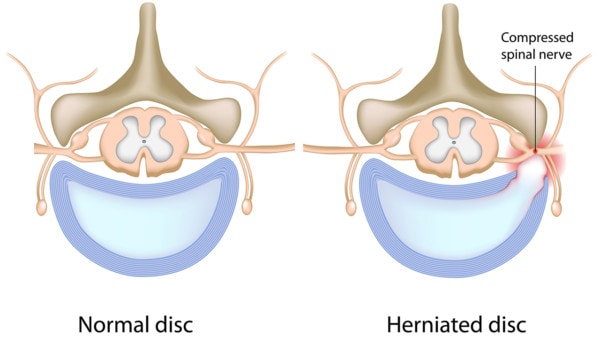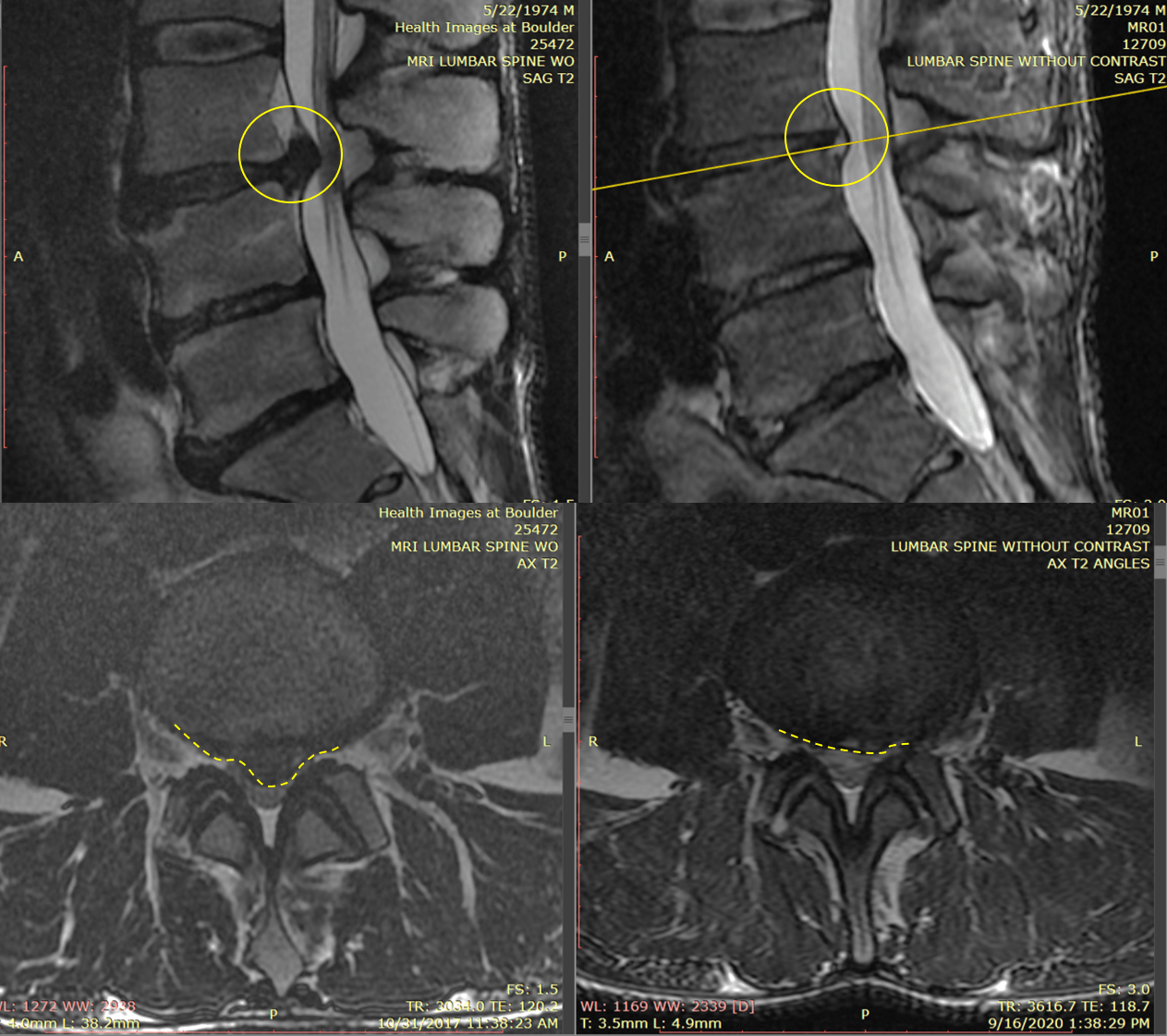How to Heal a Herniated Disc Naturally
On this page:
- What is a herniated disc?
- What is herniated disc surgery like?
- Can a herniated disc heal on its own?
- What activities should you avoid with a herniated disc?
- Is walking good for a herniated disc?
- Do supplements work?
- Is there another way to treat a herniated disc naturally?
- Do you really need surgery?
Does your body already know how to heal a herniated disc naturally? Today I’ll share yet another MRI result that’s important to me as this gentleman’s large herniated disc would have needed surgery at one point in my early career and now because of advances in natural disc healing it usually doesn’t need surgery. Let’s dig in.
What Is a Herniated Disc?

Alila Medical Media/Shutterstock
The discs are the shock absorbers between your spinal bones (vertebrae). They have a tough outer covering called an annulus fibrosis that holds in an inner soft gel-like substance called the nucleus pulposis (NP). This inner gel can herniate when the annulus gets a tear and this can cause swelling or pressure on the spinal nerve leading to sciatica (the medical term is radiculopathy).
What Is Herniated Disc Surgery Like?
Way back when, in medical education, we physicians leaned that your body didn’t know how to heal a herniated disc naturally. In fact, we were taught that patients who didn’t get better in a few weeks needed surgery. Oh how times have changed.
The first traditional treatment for a herniated disc is often physical therapy to see if the pain and symptoms go away. If that doesn’t work, the next step is often a high dose steroid epidural injection. If that doesn’t get it done, surgery is often offered.
Surgery for a herniated disc often involves removing the herniated disc material (discectomy) and sometimes a piece of the vertebra (laminectomy). While this can help symptoms, the problem is that several studies have shown that patients who get these surgeries fare no better at one year than patients who don’t get these surgeries. Meaning that there’s a real question about whether surgery is effective at all. Hence, most physicians these days advocate against surgery for a herniated disc.
Can a Herniated Disc Heal on Its Own?
The entire premise behind how to heal a herniated disc naturally is based on your body being able to get rid of the herniated disc material itself. So can your body pull that off? The short answer is YES. Several studies have shown that the average herniated disc will resorb over time (1). That means your body will clean up the material using cells called macrophages. The key is staying comfortable and being able to remain active while that happens.
What Activities Should You Avoid With a Herniated Disc?
The pressure inside the disc increases with sitting, so avoid prolonged sitting. A good workaround may be getting a sit/stand desk or attachment for an existing desk. That way you can alternate between sitting and standing while working.
Lifting from the floor and that type of bending forward (flexion) will also increase the pressure inside the disc. Hence, buying a cheap grabber off Amazon to get things from the floor is a good idea.
Is Walking Good for Herniated Discs?
Your discs get nutrition through something called imbibition. Think of a sponge. When you press a sponge, it releases water, and then when you let up, it takes in water. This is how your disc works. Hence the cyclic pressure and offloading experienced during walking can draw more water and nutrients into your disc and make it healthier.
Do Supplements Work?
Can over the counter supplements help your body to know how to heal a herniated disc naturally? One of the biggest issues in herniated discs is inflammation. Research shows that patients with more systemic inflammation take longer to heal from a herniated disc.
Supplements like fish oil containing 1,000mg of omega 3 and focused on EPA can help reduce inflammation. The same holds true for curcumin with Bioperine (a black pepper extract). These are both natural ways to modulate your chronic inflammation and help heal the problem more quickly.
Is There Another Way to Treat a Herniated Disc Naturally?
Obviously injecting steroids which can have side effects like suppressing your immune system is NOT a natural way to heal a herniated disc. Surgery, where parts are cut out, is also not natural. Is there a natural way we can ramp up healing?
Your blood platelets have natural growth factors that help things heal. Think about a paper cut. You bleed into the area and the platelets clot the blood to stop the bleeding. Then those same platelets orchestrate the healing of the skin by the precise release of growth factors. Hence, could we use platelets to ramp up the natural healing of the disc?
The patient’s MRI that’s shown below is an example of using natural healing for a disc. On the left, there is a very large L3-L4 herniated disc (yellow circle). This is a “subligamentous” type where the disc material is contained by the posterior longitudinal ligament, which acts is a big piece of duct tape that goes down the back part of your spine. This type is different than most disc herniations which just go around this ligament.
These subligamentous herniations can be notoriously hard to heal on their own since the disc material isn’t in good contact with the rest of the body. Here, I injected the patient’s own natural growth factors from their blood platelets (called platelet lysate) around the nerve (epidural). This helped to ramp up natural healing. The patient’s pain quickly dropped by 90% and he went back to all activities within weeks of these injections.
Let’s review these images in more detail:

The images on the right show the same L3-L4 disc, which is now mostly resolved without any surgery. The images on the bottom are axial or more of a “saw you in half” type of view where the disc herniation is outlined by the dashed line.
The before treatment image on the bottom left shows that the disc material has pushed into and is filling most of the spinal canal. Since this is where the nerves live, there is pressure on these descending spinal nerves. On the right, the dashed line shows that most of that pressure has been naturally relived by ramping up repair of the disc.
These images were taken because the patient is coming back in for a tune-up injection at about 2 years out from his initial treatment. He was at 100% better but had one episode of a flare-up lasting a few days that went away on its own, so he wanted to be extra careful.
Do You Really Need Surgery?
It’s very unlikely these days that surgery for a herniated disc is needed. Especially now that we can use the patient’s own natural healing growth factors to ramp up repair. Hence, if you get told you need surgery, please get a second opinion.
The upshot? Your body already knows how to heal a herniated disc naturally. You may need to help it along a bit by getting an injection of natural growth factors to ramp up that healing response, but one way or the other your body will usually get rid of that herniated disc material without surgery.
_____________________________________________
References
(1) Zhong M, Liu JT, Jiang H, et al. Incidence of Spontaneous Resorption of Lumbar Disc Herniation: A Meta-Analysis. Pain Physician. 2017;20(1):E45-E52.

NOTE: This blog post provides general information to help the reader better understand regenerative medicine, musculoskeletal health, and related subjects. All content provided in this blog, website, or any linked materials, including text, graphics, images, patient profiles, outcomes, and information, are not intended and should not be considered or used as a substitute for medical advice, diagnosis, or treatment. Please always consult with a professional and certified healthcare provider to discuss if a treatment is right for you.
